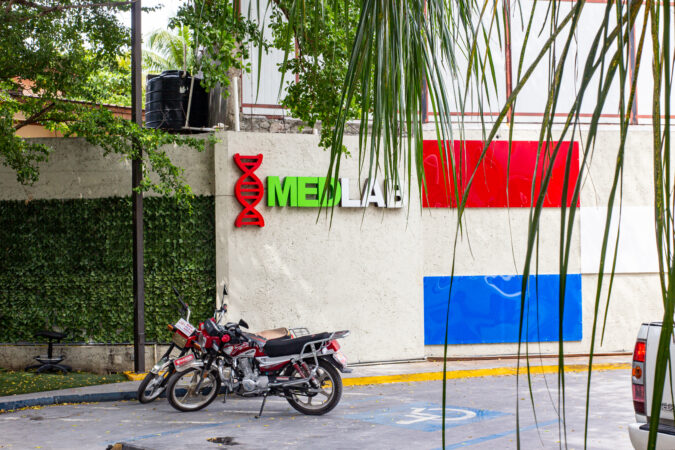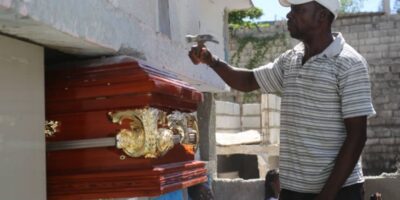Most of the men interviewed for this article seem to be unaware that feeding their own blood to newborns can lead to deadly infections
When Wilfrid Sima’s girlfriend told him in 1988 that she was pregnant and he was the father, the young man immediately harbored doubts about the child’s paternity.
In all actuality, the expectant mother was already in a relationship with someone else in Delmas 4. This is why Wilfrid Sima says he immediately contacted an uncle in Saint-Louis du Sud to figure out how to address the situation.
The southern man made two recommendations to Sima: He was to prick his finger and feed his blood to the newborn, or to wrap the baby in clothes soaked in his sweat.
Wilfrid Sima didn’t want to leave any room for uncertainty: he claims to have used both methods simultaneously. « After two days, I was called to be told that the child had died, » he revealed to AyiboPost in a phone interview.
He was to prick his finger and feed his blood to the newborn, or to wrap the baby in clothes soaked with his sweat.
Many doubtful Haitian fathers use similar methods to deny paternity.
And yet, these techniques do not work. Only a DNA test performed in a laboratory can accurately determine or disprove paternity, according to experts.
Traditional methods needlessly endanger the child’s life, says Dr. Lovelyne François. « Ingesting blood can be dangerous to the child, » the specialist affirms. « If the blood is contaminated, » she continues, « the newborn can contract all sorts of infections transmissible through contact with blood if there are lesions in the mouth. »
Many doubtful Haitian fathers use similar methods to deny paternity.
Since June 2014, Haitian laws allow a father to contest a child’s paternity within a legal procedure. However, this process, which involves DNA testing, seems unpopular, particularly in remote areas of the country.
According to Dr. Jeanty-Fils Exalus, the Communications Director of the Ministry of Public Health and Population (MSPP), the Haitian state has no healthcare structure offering paternity testing.
Also read : La justice n’a pas de budget pour effectuer les tests ADN afin de vérifier les paternités
DNA tests – available only in private institutions in Port-au-Prince and Cap-Haïtien – remain out of reach for many potential fathers.
At Medlab, a major laboratory in the metropolitan region, a DNA test costs 35,000 gourdes. The price rises to $450 USD at Biomed, another medical facility in the capital.
At the « La Maternité du Cap-Haïtien » clinic, a regular test costs $400 USD and a legally requested test costs $500 USD.
The Haitian state has no healthcare structure that offers paternity testing.
35 years after the incident, Wilfrid Sima, who has been living in Brazil for two years, believes that « the mother killed her own child. » He reveals that he has other « living » offspring on whom he has used the same methods. He believes that the death of the newborn is a « miracle from God » that prevented him from « taking on a responsibility that wasn’t his. »
These false beliefs permeate Haitian society.
Dickenson Saint-Paul, 36 years old, didn’t settle for feeding his own blood to three of his six children when his partner told him he wasn’t their father during an argument in 2017. He also tried a second method advised, he says, by his grandmother: placing a leaf of « musa paradisiaca » (burro banana leaf) under the mother’s back along with a prayer. If the child is from another man, the mother will die, claims the native of Nippes, as told to AyiboPost.
Saint-Paul’s partner and children survived his non-scientific and ineffective methods.
Also read : Son conjoint l’a fait passer 8 ans en prison pour avortement. Elle ne savait pas qu’elle était enceinte.
Married to his wife for sixteen years, Yves Joanel Valentin lives in Saint-Michel du Sud. While he feeds his own blood to all three of his children with his partner, it’s not because he harbors suspicions. « You never know what might happen, » he confides to AyiboPost.
Christophe Noël is less pragmatic. All six of his children, including the youngest who is currently eighteen years old, have undergone the test. « I don’t trust anyone, especially not women because they tend not to honor their commitments, » declares the man in his forties from Bocco in Nippes.
These methods remain dangerous and provide no usable information, according to experts.
DNA tests – available only in private institutions in Port-au-Prince and Cap-Haïtien – remain out of reach for many potential fathers.
In the case of ingesting nail cuticles, the child can develop gastroenteritis due to the ingestion of microbes, because they would ingest the microbes that reside under the nails, explains Dr. Lovelyne François, an internist at Saint-Boniface Hospital in Fond-des-Blancs.
Furthermore, « it’s possible for a child to have a different blood type than their parents, » Dr. François reminds us.
Wrapping the child up also carries its own risks. According to the doctor, if the process lasts long enough, it can cause irreversible brain damage in the child due to hypoxia, which is a decrease in oxygen in their body.
The body of a newborn is vulnerable, and the nail cuticle can obstruct the inside of the appendix and cause appendicitis, according to general practitioner Dr. Mackensy Dornevil.
In the case of ingesting the nail cuticle, the child can develop gastroenteritis due to the ingestion of microbes. This is because they would ingest the microbes that reside under the nails
Haitian legislation allows for a father in doubt to verify the paternity of a child.
According to lawyer Caleb Deshommes, this verification must follow the procedures outlined in the law of June 14, 2014. DNA testing is the only legal means: « Archaic methods are illegal, » the lawyer specifies. « These practices challenge the right to life. The state, as a protector of human rights, does not endorse these practices, » the specialist adds.
Giving a substance to a newborn knowing that it could result in their death is considered murder and infanticide, according to articles 241, 245, and 246 of the Penal Code. All of these offenses are punishable by forced labor for life, per article 247 of said code.
To address this issue, Attorney Deshommes believes that there needs to be a policy of awareness and legal training for these fathers surrounding the risks posed by these methods to the lives of the babies. They must understand, according to the lawyer, that these actions constitute a criminal violation and can lead to convictions.
Giving a substance to a newborn knowing that it could result in their death is considered murder and infanticide, according to articles 241, 245, and 246 of the Penal Code.
Most of the men interviewed in the context of this article seem to be aware of the consequences of their actions.
Yves Joanel Valentin does not dispute that committing a harmful act to a child’s life is a crime, but according to him, only the mother is responsible. « If the child is mine, anything I do will have no impact on their life. The real criminal, » the man adds, « is the mother. » And even if the child were to pass away, Valentin continues, « I wouldn’t feel any regret. »
Also read : Kisa fenomèn fanm travèse gason an ye menm ?
Dickenson Saint-Paul holds a less radical opinion. He tells AyiboPost that he would do it again if he had to, although he would have been distressed. In the event of the child’s death, he wouldn’t have spared the mother’s life, he says. « Fortunately for her, the child survived, » Saint-Paul concludes in a firm tone.
English translation by Sarah Jean.
Stay in touch with AyiboPost through :
▶ Our Telegram canal : click here
▶ Our WhatsApp Community : click here








Comments